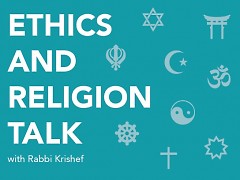I asked the panel to consider Karla’s question against the backdrop of the verse from Christian scriptures, Matthew 7:1, "Judge not that you not be judged.”
Rev. Ray Lanning, a retired minister of the Reformed Presbyterian Church of North America, responds:
“The famous words of Christ, ‘Judge not, that ye be not judged’ were never intended to abolish critical thinking. Rather, as Christ goes on to say, we must consider the standard we apply in judging the words or conduct of others: ‘For with what judgment ye judge, ye shall be judged’ (Matthew 7:2). To hold others to a higher standard than we set for ourselves is hypocrisy. To judge harshly, without mercy or compassion, is a contradiction of the gospel of grace that we proclaim. But Christ Himself teaches us to judge or evaluate every ‘tree’ by its ‘fruits,’ since ‘a good tree cannot bring forth evil fruit, neither can a corrupt tree bring forth good fruit’ (Matthew 7:18). Faith, as James said, must be shown by its deeds.
“With regard to leaders in public life, we must remember that the apostle Paul draws a line between those who profess to be Christians and those who do not. ‘I have written unto you not to keep company, if any man that is called a brother be a fornicator, or covetous, or an idolater, or a railer, or a drunkard, or an extortioner; with such a one no not to eat’ (I Corinthians 5:11). Those who appeal for our votes by claiming to be fellow Christians must be held to account for their words and deeds. It is wrong to excuse or explain away their misconduct. And worse to turn a blind eye to it, or justify it by pointing to some higher end to be gained by putting them into office.”
Father Michael Nasser, who writes from an Eastern Christian perspective and is Pastor of St. Nicholas Orthodox Christian Church, responds:
“What constitutes ‘judging’ is one of the most confused concepts in our day, as evidenced especially by today’s teens who seem to receive any differing view on any issue as ‘judging.’ To ‘judge’ according to the original meaning of this verse is to reach a verdict on another, especially the verdict of ‘guilty or innocent.’ The Bible is clear that this authority is reserved for God alone.
“But God didn’t create us to be stupid; He created us with immeasurable intelligence, in order to understand both the world He has given us and the stewardship of it that He calls us to, and His teaching on how we ought to live in it: how we treat everyone and everything around us. To recognize which actions—either our own or others’— are good, healthy and wise is an act which uses the intelligence and wisdom God has given us. The injunction against judging means I should first of all never pronounce judgement—naming another as either guilty or innocent, unless I am fulfilling a societal function for keeping good order, as a judge or jury must do on to enable the rest of us to avoid this unpleasant action.”
R. Scot Miller, who writes from an Anabaptist and Quaker Christian perspective, responds:
“If we hold ourselves and our faith community accountable for our public and private actions, behaviors, and consumer habits, we must often reject to follow the mandates or habits of the publicly generated goals toward where we are being lead. One must hold leaders accountable through elections or legal recourse if they in fact participate in electoral politics and rely on the nation state to generate the best outcomes. However, when those outcomes violate the faithful beliefs of a religious body, that body must exercise a rejection of those obligations the nation state assumes it can burden you with. The Quaker John Woolman believed that slavery was abhorrent to the God of Abraham and Sarah, and so not only rejected slave ownership, but ministered throughout the south in efforts to talk slave owners into giving up their slaves. He would not accept meals made from slave labor, he would not wear clothes made or dyed from products produced by slaves, and would often violate laws by paying slaves for services rendered. He even chose not to accept doing clerking work for business clients who owned slaves, refusing to write out the necessary paperwork for the purchases of other human beings as property. John Woolman and other early Quakers, like those who instituted the Underground Railroad, held slave owners and politicians who supported slavery accountable by risking their own freedom to act morally as an example of Christian behavior, and by violating property laws to help slaves escape to freedom. We cannot always hold people accountable for sin, so we in fact must accept our obligation to sacrifice so that we are accountable to our God.”
This column answers questions of Ethics and Religion by submitting them to a multi-faith panel of spiritual leaders in the Grand Rapids area. We’d love to hear about the ordinary ethical questions that come up on the course of your day as well as any questions of religion that you’ve wondered about. Tell us how you resolved an ethical dilemma and see how members of the Ethics and Religion Talk panel would have handled the same situation. Please send your questions to [email protected].
The Rapidian, a program of the 501(c)3 nonprofit Community Media Center, relies on the community’s support to help cover the cost of training reporters and publishing content.
We need your help.
If each of our readers and content creators who values this community platform help support its creation and maintenance, The Rapidian can continue to educate and facilitate a conversation around issues for years to come.
Please support The Rapidian and make a contribution today.
